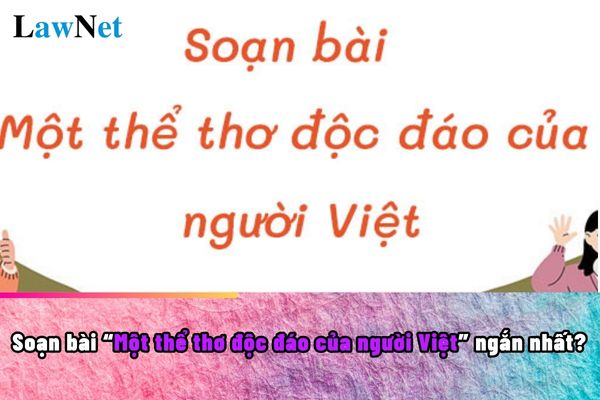What are guidelines on preparing a lesson plan for the lesson "Một thể thơ độc đáo của người Việt" for students in Vietnam? How many Literature periods for grade 9 students in Vietnam?
What are guidelines on preparing a lesson plan for the lesson "Một thể thơ độc đáo của người Việt" for students in Vietnam?
The lesson "Một thể thơ độc đáo của người Việt" is one of the contents that grade 9 students will study in the grade 9 Literature program.
Grade 9 students can refer to the following guidelines on preparing a lesson plan for the lesson "Một thể thơ độc đáo của người Việt" as follows:
|
Guidelines on preparing a lesson plan for the lesson "Một thể thơ độc đáo của người Việt" *General Evaluation |
*Note: The information is for reference only./.

What are guidelines on preparing a lesson plan for the lesson "Một thể thơ độc đáo của người Việt" for students in Vietnam? How many Literature periods for grade 9 students in Vietnam?(Image from the Internet)
How many Literature periods for grade 9 students in Vietnam?
Based on the General Education Program issued with Circular 32/2018/TT-BGDDT:
- Execution time of the program in classes (according to the number of lessons)
| Grade 1 | Grade 2 | Grade 3 | Grade 4 | Grade 5 | Grade 6 | Grade 7 | Grade 8 | Grade 9 | Grade 10 | Grade 11 | Grade 12 |
| 420 | 350 | 245 | 245 | 245 | 140 | 140 | 140 | 140 | 105 | 105 | 105 |
- In upper secondary school, each grade has an additional 35 periods for elective study themes.
Thus, the number of Vietnamese language lessons for Grade 9 is 140 periods.
What contents are required in the Grade 9 Vietnamese language program?
Based on subsection 2, section 5 of the Vietnamese Literature Subject Program issued with Circular 32/2018/TT-BGDDT, grade 9 students will learn the following contents in Vietnamese Literature:
*VIETNAMESE LANGUAGE KNOWLEDGE
- Preserving and developing the Vietnamese language
- Logical and ambiguous sentence errors and how to fix them
- Rhetorical measures of sarcasm and paradox: characteristics and effects
- Text types and genres
+ Argumentative text: the role of points, arguments, and evidence; the purpose, feelings, and viewpoints of the writer; measures to enhance affirmation and negation in argumentative texts;
the way of reasoning and expressive language; a speech in the inauguration of a movement or a social activity; an essay on a youth-related issue; a comparative and evaluative essay on two literary works of the same or different genres
+ Informative text: the value of the topic, main information of the text; types of data and reliability of data; workplace correspondence; reporting the results of project assignments or research on a natural or social issue
- Respecting and protecting intellectual property rights in learning and research
- Basic characteristics of formal and informal language: understanding and application
- Non-verbal communication tools: images, data, charts, diagrams,...
*LITERATURE KNOWLEDGE
- Cognitive, educational, and aesthetic functions of literature
- The compatibility between the theme, thought, and main inspiration
- Some manifestations of artistic style in folk literature, medieval literature, modern literature, realistic and romantic trends; the artistic style of the author
- Some elements of legendary stories, novels (modern and post-modern), modern lyrical poetry, comedy, reportage
+ Legendary stories: topic, characters, language, artistic techniques; assessing the role of supernatural elements in legendary stories, relating it to their role in folk tales
+ Novels (modern and post-modern): language, psychological development, actions of characters
+ Modern lyrical poetry: language, images, symbols, symbolic and surreal elements
+ Comedy: language, characters, situations, satirical techniques
+ Reportage, diaries, or memoirs: non-fictional nature, description, narration; the combination of real details and events with the experiences, attitudes, and assessments of the writer
- Character’s psychological development and ways to express the character’s psychology of writers
- The narrator’s relationship, viewpoint in expressing the text’s theme
- Basic understanding of Ho Chi Minh's works to aid in the comprehension of some of his prominent works
- Brief history of literature and the role of background knowledge in literary history in comprehending texts.

